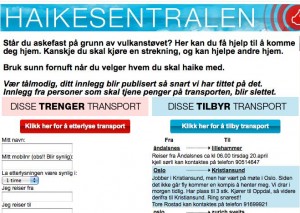As briefly noted on this blog earlier, Norwegian newspaper Verdens Gang (known as VG), has put together a ‘Hitchhiker’s Central’ page on its site, for travellers stranded by the volcano ash cloud to arrange emergency overland transport.
Media journalist Kristine Lowe reports on her blog how she was able to use the service to help get Journalism.co.uk trainer Colin Meek home from an online course he was teaching in Oslo.
“What VG.no could offer in this situation was scale. With its close to 3 million unique users a week it offered people a brilliant connection point that few other sites could,” says Kristine. “It’s a great service to its readers and, I’m sure, a great click winner too.”

How Kristine set up Colin’s journey home:
[W]hen I found a friend who was willing to drive from Oslo to Dover and back to get him home, I was able to fill up the car in both directions, thereby covering the costs of the trip, by submitting a message to Hitchhiker’s Central. I did call around a few other travellers advertising for lift to London before submitting an ad myself, and several of those I talked to had already found lift from Oslo to London which suggests my experience was not unique.
Within minutes of placing an “ad” (a free message) on Hitchhiker’s central, the receptionist at a Rica hotel in Oslo called me to ask if I had room for a British businessman staying at the hotel (…) The last passenger on the trip to Dover (they arrived this morning) was a Norwegian student desperate to get back to the UK for his exams at Cardiff University. On the way back to Oslo, the car will bring a salesman, a singer and a conductor – all Norwegians who were stranded in London.
Without this arrangement via VG.no, overland costs were adding up to around £1000, Colin tells me. A Eurostar one-way fare was going to be around £250 and the one-way ferry crossing from Oslo to Copenhagen would have been 1950NoK (£215) minimum. “It would have taken me about three days – at least – with no guarantee that some of the legs would be available.”
So, VG.no’s collaborative site has been helpful, both in terms of cost and time for Colin. But, he adds, the 18-hour car journey was something of a personal challenge – he’s getting on the sleeper train back home to Scotland.
